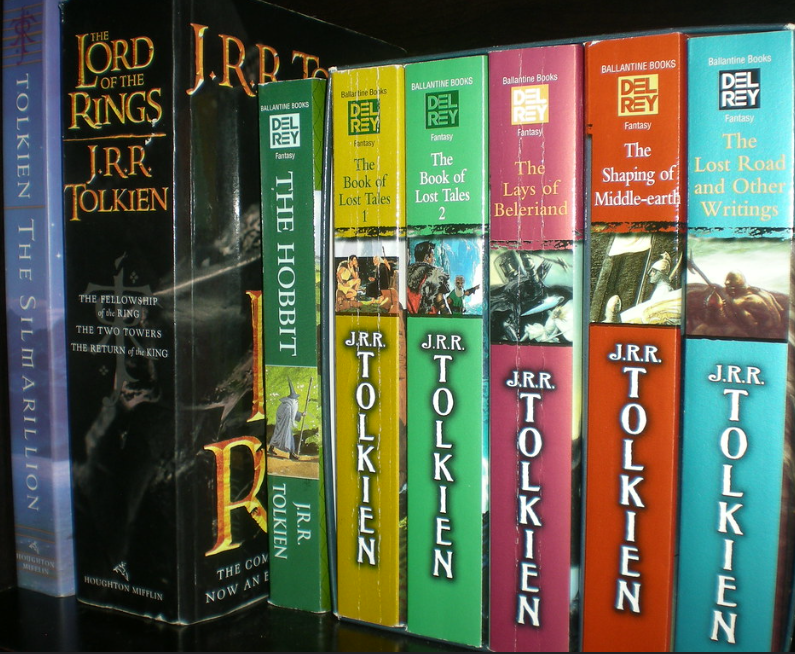
Mordor & Back
I first stumbled into Tolkien’s Middle-earth when I heard
The Fellowship of the Ring being read aloud on a train from Haymarket to
Kinghorn when I was ten. His cryptic and mystical world seemed quite wonderful
to me. Gondor, Mordor, Rohan and The Shire, depicted in a three-thousand-year
saga referred to as the Third Age of Middle-earth; had been most welcomed by a
kid who was into Jason and the Argonauts and tales from The Iliad. Sadly, I was
not reacquainted with Tolkien again until I saw the films in my early thirties.
I did finally read the trilogy soon afterwards and enjoyed them immensely.
You either love Tolkien or you don’t. His portrayal of Earth’s history is
either fascinating or boring to many. I was quite smitten and so I was keen to
see how the new TV series The Rings of Power, would pan out. I am a fan of the
film trilogy sure, but I promise you that the books are better. This is because
there is so much more to Tolkien’s mythology than meets the eye. Primarily the
First and Second Ages of Middle-earth and stories such as The Book of Lost
Tales, and The History of Middle-earth, which are handy places to begin. The
stories and potential stories living in the old maestro’s extensive
legendarium, are vast and many of which play a massive part in how things
develop in the Third Age when the Ring Trilogy is set. It always seemed to me
that someone was missing a trick there and that there would have to be another
film or big TV series at some point.
I did feel that developing a serious TV show in Tolkien’s world would require
it to complement the earlier big-budget movies. The method of achieving this,
it seemed to me, should not be dependent upon no-expense-spared sets or
costumes. As we know from say, I Claudius, a good story line complemented by
good actors, is what the doctor ordered. If you can figure that much out, it
won’t matter if your set is made from cardboard. I had similar apprehensions
regarding Game of Thrones follow-up House of Dragon too. Having been quite
weary of potential let-downs there, I was pleasantly surprised to find the
recent series had a strong second half too. The House of Dragon season finale
being precisely what Game of Thrones fans needed.
The Rings of Power series is seen through the eyes of Morfydd Clark, who plays
the immortal elven warrior Galadriel (played by Cate Blanchet in the films). It
is set at the end of the Second Age of Middle-earth, when the rings are first
forged by the great elven smith Celebrimbor. Galadriel has seen it all over
thousands of years; there is an account of her story in, The Road Goes Ever On,
and The Silmarillion. Galadriel is one of the oldest characters from the many
ages of Middle-earth. She witnessed the legendary flight of the elves from the
heavenly Valinor in the First Age of Middle-earth. It was also said that she
was, “the only female to stand tall in those days.”
The acting here is sound enough, particularly Robert Aramayo as Elrond. We
learn a little more about the chronology of events too, whilst receiving an
introduction to the angelic Maiar and Valar. There are only a few Valar
emissaries who have been sent from the sky to Middle-earth to assist it against
Sauron, a tyrannical entity who has been cast down from the sky. Gandolf
perhaps, being the better known of them. Even still, I took a while to warm to
both Clark as Galadriel and the show itself, which I duly ended up doing by
episode five. Though I must admit that I didn’t see the point in the love
affair sideliner between the Elve Arondir; played by Ismail Cruz, who would
have made a better Sauron, and Persian actress Nazanin Boniadi, who plays
Bronwyn. Their lovey-dovey thing clings to the unfurling chaos like acne barnacles
to an unfortunate teenager. The show itself feels like a big movie production
throughout and I didn’t want it to finish by the time it wound up. I started
reading The Silmarillion thereafter, which says it all really.
Post Views : 1376